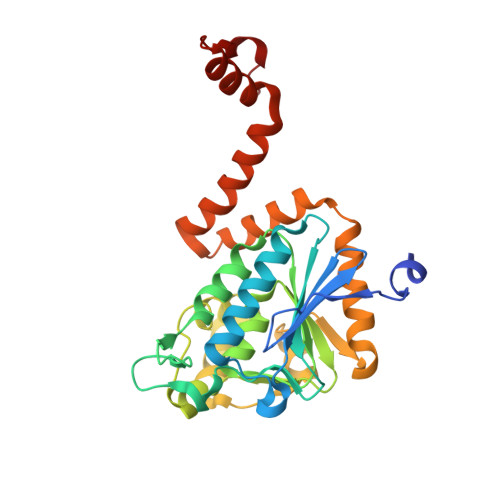Mechanism of the Intramolecular Claisen Condensation Reaction Catalyzed by MenB, a Crotonase Superfamily Member.
Li, H.J., Li, X., Liu, N., Zhang, H., Truglio, J.J., Mishra, S., Kisker, C., Garcia-Diaz, M., Tonge, P.J.(2011) Biochemistry 50: 9532-9544
- PubMed: 21830810
- DOI: https://doi.org/10.1021/bi200877x
- Primary Citation of Related Structures:
3T88, 3T89, 3T8A, 3T8B - PubMed Abstract:
MenB, the 1,4-dihydroxy-2-naphthoyl-CoA synthase from the bacterial menaquinone biosynthesis pathway, catalyzes an intramolecular Claisen condensation (Dieckmann reaction) in which the electrophile is an unactivated carboxylic acid. Mechanistic studies on this crotonase family member have been hindered by partial active site disorder in existing MenB X-ray structures. In the current work the 2.0 Å structure of O-succinylbenzoyl-aminoCoA (OSB-NCoA) bound to the MenB from Escherichia coli provides important insight into the catalytic mechanism by revealing the position of all active site residues. This has been accomplished by the use of a stable analogue of the O-succinylbenzoyl-CoA (OSB-CoA) substrate in which the CoA thiol has been replaced by an amine. The resulting OSB-NCoA is stable, and the X-ray structure of this molecule bound to MenB reveals the structure of the enzyme-substrate complex poised for carbon-carbon bond formation. The structural data support a mechanism in which two conserved active site Tyr residues, Y97 and Y258, participate directly in the intramolecular transfer of the substrate α-proton to the benzylic carboxylate of the substrate, leading to protonation of the electrophile and formation of the required carbanion. Y97 and Y258 are also ideally positioned to function as the second oxyanion hole required for stabilization of the tetrahedral intermediate formed during carbon-carbon bond formation. In contrast, D163, which is structurally homologous to the acid-base catalyst E144 in crotonase (enoyl-CoA hydratase), is not directly involved in carbanion formation and may instead play a structural role by stabilizing the loop that carries Y97. When similar studies were performed on the MenB from Mycobacterium tuberculosis, a twisted hexamer was unexpectedly observed, demonstrating the flexibility of the interfacial loops that are involved in the generation of the novel tertiary and quaternary structures found in the crotonase superfamily. This work reinforces the utility of using a stable substrate analogue as a mechanistic probe in which only one atom has been altered leading to a decrease in α-proton acidity.
Organizational Affiliation:
Institute for Chemical Biology & Drug Discovery and Department of Chemistry, Stony Brook University, Stony Brook, New York 11794, United States.


















